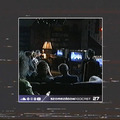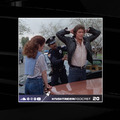<- back to Parallaxis Universe (Hungarian)
Who are you?
We are a community of people in our thirties and forties who share a deep fascination with the world of science and the universe of science fiction films and series. For us, the movies, shows, and culture of the 1980s and 1990s form a defining part of our personal experience. We come from diverse professional backgrounds – among us are physicists, rocket engineers, IT experts, communication and advertising professionals, economists, and media creators. You can read more about the contributors to our podcasts here, and you’ll find our current production team listed here.
What do you aim to do?
Our goals are threefold: to entertain, to educate, and – depending on the format – to explore. Essentially, we delve into the intertwining of imagination, retro aesthetics, and culture; the history of space exploration; and the scientific background of films. In doing so, we aim to present their interconnections and human dimensions in the most engaging, accessible, and entertaining way possible.
What is the Parallaxis Universe?
The Parallaxis Universe continues the legacy of Parallaxis, a sci-fi and fantasy magazine that began in 1999 and ran for nearly ten years on ParaRádió. The show’s former editor-in-chief, Ádám Tamás Horváth, began reviving the project in 2017, and after several pilot episodes, the Parallaxis Podcast officially debuted on February 1, 2018. Its very first episode became an instant breakthrough, reaching over 15.000 listens – still our most popular to this day.
After several guest appearances in the first season, Miklós Vincze, senior research fellow at the HUN-REN–ELTE Theoretical Physics Research Group and Junior Prima Award-winning physicist, joined as a permanent host in season two. He also serves as editor-in-chief and presenter of Sokolébresztő on Tilos Rádió, whose podcast version soon joined the Parallaxis Universe’s channels. From 2021 onward, new original shows followed – including the science-oriented Planetocast, the sci-fi literature podcast SzubZsáner, the retro film show White Sam, the media industry podcast Médiazabálók, and the Star Trek-themed Űrszekerek.
(SzubZsáner literally means SubGenre in Hungarian, it refers to the different branches or subgenres of science fiction literature. In White Sam, the word "sam" is pronounced the same way as the Hungarian word "szem", meaning "eye", so the title sounds playful in Hungarian, like "White Eye." In Médiazabálók, the word "zabálók" comes from the verb "zabálni", which means "to gobble" or "to binge". So Médiazabálók roughly translates to Media Gobblers or Media Bingers – people who consume a lot of media content. Űrszekerek is the official Hungarian translation of Star Trek, used when the first movie was released in Hungary. The word literally means space wagons or space carts – a charmingly old-fashioned Hungarian expression evoking "travellers or vehicles journeying through space".)
In 2023, Screamcast, a show analyzing horror films, debuted, along with the Parallaxis Retroverzum lineup: Retrozabálók, and discussion podcasts dedicated to Columbo (Csak még egy kérdés! means: Just one more question!), Szomszédok (means: Neighbours) (Lantos utca 8. means: Lantos Street 8.), and Knight Rider (Helló, Pajti means: Hello, Buddy). With this expansion, the Parallaxis podcast multiverse began releasing three new episodes weekly. In 2025, two new series joined: Hinni akarunk (We want to believe), exploring the mysteries of The X-Files, and A mi hangunk mélyebb (Our voice is deeper), dedicated to the cinematic world of Terence Hill and Bud Spencer. In 2026, two more productions will follow: A podcast ami szeretett engem (The podcast who loved me), inspired by the James Bond universe, and Floppy & kazetta (Floppy & cassette), for retro geek culture enthusiasts.
How does the management work?
The Parallaxis Universe is overseen by the Brain Center, a creative decision-making body composed of the show’s creative producers, editors-in-chief, senior and executive editors, and lead contributors. The majority of operational work is handled by Ádám Tamás Horváth, who serves as production manager – responsible for scheduling, overseeing post-production, and deciding which shows go on hiatus and which ones begin new seasons. When a new host is needed, he personally casts them and ensures the unified style, tone, and communication of the Parallaxis Universe. Gergely Gizur also plays a vital creative role, particularly in defining the unique atmosphere, structure, and tone of the Retroverzum programs. More broadly, every member of the Brain Center contributes to the Parallaxis Universe’s daily operations and long-term direction, each according to their own responsibilities and areas of expertise.
Have you had any cool guests?
We’ve had the honor of hosting many outstanding scientists and creators, including Avi Loeb, theoretical physicist and professor at Harvard University, who proposed the possibility of an extraterrestrial origin for ’Oumuamua; Russell Schweickart, Apollo 9 astronaut and the world’s first lunar module pilot; and Brian Schmidt, Nobel Prize-winning physicist recognized for his research on the expanding universe. We’re also proud that Gyula Dávid, one of Hungary’s most beloved science communicators, and Orsolya Ferencz, space researcher and ministerial commissioner for space research in the fifth Orbán government, have both appeared on our shows.
What are your financial resources?
All of the Parallaxis Universe’s podcasts, blogs, and social media channels are produced entirely through volunteer work. Creating technically and editorially strong content often entails considerable costs, which we strive to cover independently. Our income from YouTube and community support is modest, but our listeners have repeatedly shown extraordinary generosity during our crowdfunding campaigns. We are deeply grateful to all our supporters – without them, our podcasts would not be possible.
Why don’t you produce video podcasts?
We’ve chosen to stay audio-only because audio podcasts require far fewer resources while allowing us to focus on content rather than visuals. Our episodes are recorded online rather than in a studio, and the varying webcam quality, lighting, and framing of our contributors would prevent us from achieving a consistent, professional look. Additionally, our shows are heavily edited and paced for clarity and energy – qualities that the audio format supports far more flexibly and creatively than video ever could.
What software do you use?
We record our episodes using the Zencastr online platform, while our team members also record locally with Audacity. Part of the post-production is done in Audacity, while Adobe Audition is used for fine-tuning and mixing. To further improve microphone quality (currently on a trial basis), we also use Adobe Podcast, an AI-based enhancement service. For the “animated” YouTube editions, we edit in Adobe Premiere Pro, design visuals in Adobe Photoshop, and occasionally stream live shows using OBS Studio. Our visual branding is primarily created by [emdé] média, while voiceovers are recorded by MDM Dubbing. Most of our opening titles and intros come from Storyblocks, though some are composed – sometimes with AI assistance – by Melon.
Have you won any awards?
Yes. In 2019, our work received the Juhari Zsuzsanna Special Award from the Hungarian Association of Science Journalists and the Scientific Educational Society. In 2020, 2021, and 2023, we were also recognized with certificates of excellence for our high-quality blog.
Why do you do all this?
Because we love science, culture, and all things retro. We enjoy sharing knowledge and ideas in an entertaining way through the Parallaxis Universe, a podcast multiverse validated both by professional recognition and the dedication of our contributors. Our monthly average listenership reaches 15.000 plays.




